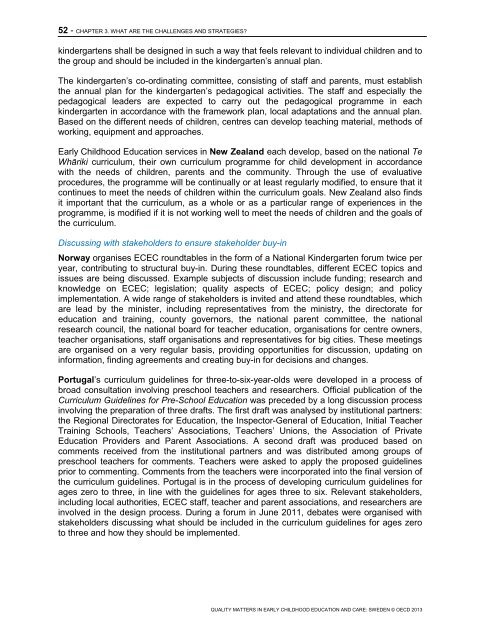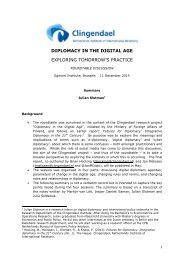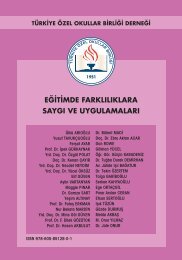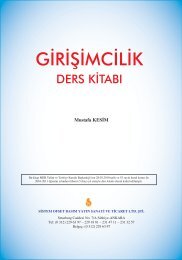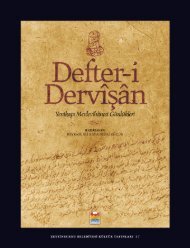SWEDEN%20policy%20profile%20-%20published%2005-02-2013
SWEDEN%20policy%20profile%20-%20published%2005-02-2013
SWEDEN%20policy%20profile%20-%20published%2005-02-2013
You also want an ePaper? Increase the reach of your titles
YUMPU automatically turns print PDFs into web optimized ePapers that Google loves.
52 - CHAPTER 3. WHAT ARE THE CHALLENGES AND STRATEGIES?<br />
kindergartens shall be designed in such a way that feels relevant to individual children and to<br />
the group and should be included in the kindergarten’s annual plan.<br />
The kindergarten’s co-ordinating committee, consisting of staff and parents, must establish<br />
the annual plan for the kindergarten’s pedagogical activities. The staff and especially the<br />
pedagogical leaders are expected to carry out the pedagogical programme in each<br />
kindergarten in accordance with the framework plan, local adaptations and the annual plan.<br />
Based on the different needs of children, centres can develop teaching material, methods of<br />
working, equipment and approaches.<br />
Early Childhood Education services in New Zealand each develop, based on the national Te<br />
Whāriki curriculum, their own curriculum programme for child development in accordance<br />
with the needs of children, parents and the community. Through the use of evaluative<br />
procedures, the programme will be continually or at least regularly modified, to ensure that it<br />
continues to meet the needs of children within the curriculum goals. New Zealand also finds<br />
it important that the curriculum, as a whole or as a particular range of experiences in the<br />
programme, is modified if it is not working well to meet the needs of children and the goals of<br />
the curriculum.<br />
Discussing with stakeholders to ensure stakeholder buy-in<br />
Norway organises ECEC roundtables in the form of a National Kindergarten forum twice per<br />
year, contributing to structural buy-in. During these roundtables, different ECEC topics and<br />
issues are being discussed. Example subjects of discussion include funding; research and<br />
knowledge on ECEC; legislation; quality aspects of ECEC; policy design; and policy<br />
implementation. A wide range of stakeholders is invited and attend these roundtables, which<br />
are lead by the minister, including representatives from the ministry, the directorate for<br />
education and training, county governors, the national parent committee, the national<br />
research council, the national board for teacher education, organisations for centre owners,<br />
teacher organisations, staff organisations and representatives for big cities. These meetings<br />
are organised on a very regular basis, providing opportunities for discussion, updating on<br />
information, finding agreements and creating buy-in for decisions and changes.<br />
Portugal’s curriculum guidelines for three-to-six-year-olds were developed in a process of<br />
broad consultation involving preschool teachers and researchers. Official publication of the<br />
Curriculum Guidelines for Pre-School Education was preceded by a long discussion process<br />
involving the preparation of three drafts. The first draft was analysed by institutional partners:<br />
the Regional Directorates for Education, the Inspector-General of Education, Initial Teacher<br />
Training Schools, Teachers’ Associations, Teachers’ Unions, the Association of Private<br />
Education Providers and Parent Associations. A second draft was produced based on<br />
comments received from the institutional partners and was distributed among groups of<br />
preschool teachers for comments. Teachers were asked to apply the proposed guidelines<br />
prior to commenting. Comments from the teachers were incorporated into the final version of<br />
the curriculum guidelines. Portugal is in the process of developing curriculum guidelines for<br />
ages zero to three, in line with the guidelines for ages three to six. Relevant stakeholders,<br />
including local authorities, ECEC staff, teacher and parent associations, and researchers are<br />
involved in the design process. During a forum in June 2011, debates were organised with<br />
stakeholders discussing what should be included in the curriculum guidelines for ages zero<br />
to three and how they should be implemented.<br />
QUALITY MATTERS IN EARLY CHILDHOOD EDUCATION AND CARE: SWEDEN © OECD <strong>2013</strong>


